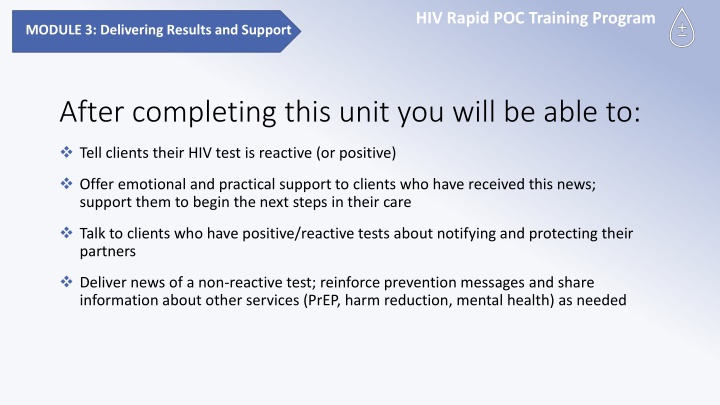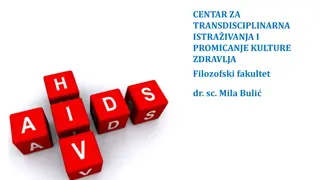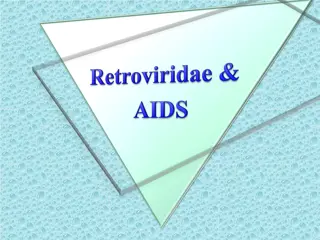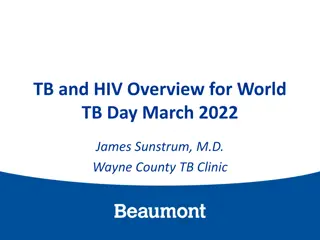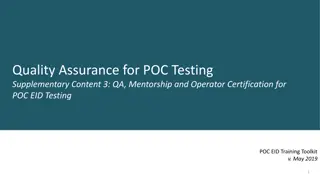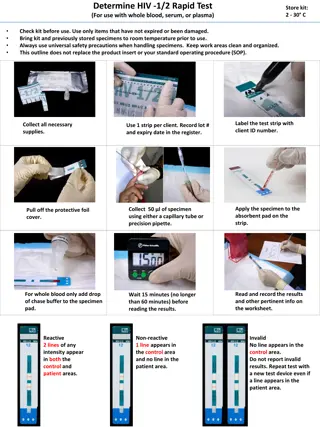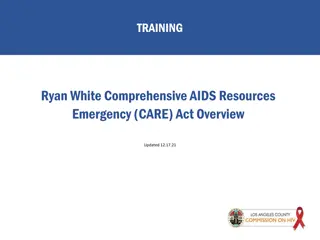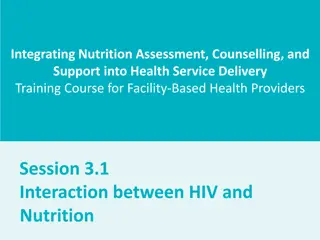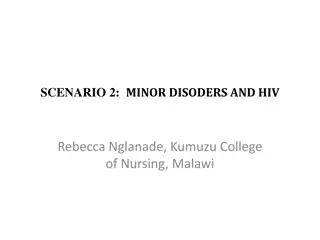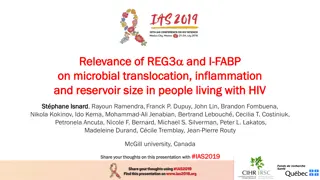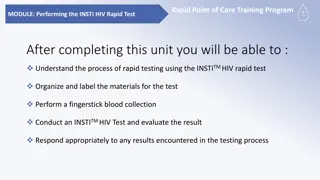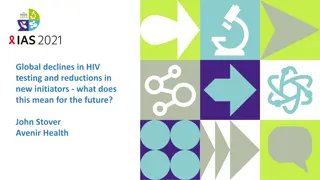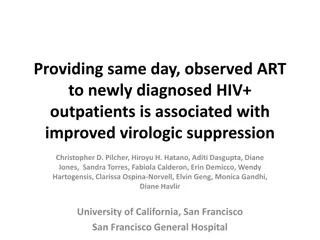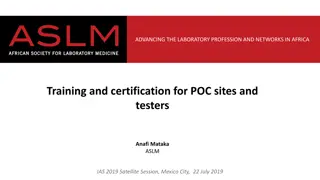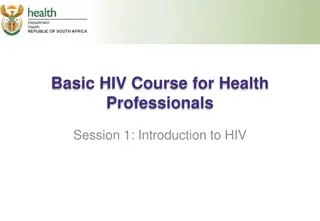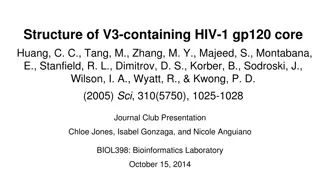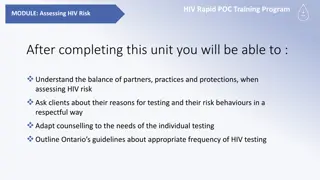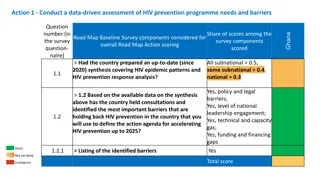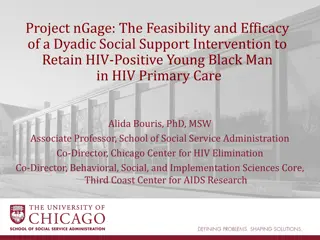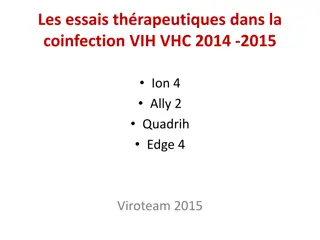HIV Rapid POC Training Program - Delivering Results and Support
In Module 3 of the HIV Rapid POC Training Program, you will learn how to handle delivering reactive (or positive) HIV test results to clients. It covers providing emotional support, discussing next steps in care, notifying and protecting partners, and reinforcing prevention messages. The module emphasizes the importance of immediate support, linkage to care, and empowering clients through information about HIV treatment options and living with HIV.
Uploaded on Sep 30, 2024 | 17 Views
Download Presentation

Please find below an Image/Link to download the presentation.
The content on the website is provided AS IS for your information and personal use only. It may not be sold, licensed, or shared on other websites without obtaining consent from the author.If you encounter any issues during the download, it is possible that the publisher has removed the file from their server.
You are allowed to download the files provided on this website for personal or commercial use, subject to the condition that they are used lawfully. All files are the property of their respective owners.
The content on the website is provided AS IS for your information and personal use only. It may not be sold, licensed, or shared on other websites without obtaining consent from the author.
E N D
Presentation Transcript
HIV Rapid POC Training Program MODULE 3: Delivering Results and Support After completing this unit you will be able to: Tell clients their HIV test is reactive (or positive) Offer emotional and practical support to clients who have received this news; support them to begin the next steps in their care Talk to clients who have positive/reactive tests about notifying and protecting their partners Deliver news of a non-reactive test; reinforce prevention messages and share information about other services (PrEP, harm reduction, mental health) as needed
HIV Rapid POC Training Program MODULE 3: Delivering Results and Support When an HIV Test is Reactive (or Positive) Be direct: for example, It s not the news we hoped for. Your test is reactive. Common Reactions when a person has a reactive test: Disbelief / shock Anger at the person they think infected them Anger at the person giving the test result (you) Guilt/shame about being infected Fear and uncertainty about their future Anxiety about the health of their partners/children Relief that their symptoms are explained All of these are normal responses. Talking about how others have responded to testing positive may offer reassurance and give them insight into their own feelings.
HIV Rapid POC Training Program MODULE 3: Delivering Results and Support First Steps after a Reactive (or Positive) Test Provide immediate comfort and support. Answer questions, but remember that the client may not be able to retain the information. Encourage them to express their emotions Remind them that there are now many treatments for HIV that allow people to live long, healthy lives. You will help them find a doctor and other supports they need. Often people say this first appointment was a blur. Double back to talk about the people in their life that can support them (discussed in the pre-test counselling); will they be able to see this person today? Key issues to discuss are included on your checklist, as you begin a talk about next steps.
HIV Rapid POC Training Program MODULE 3: Delivering Results and Support Next Steps after a Reactive (or Positive) Test Linkage to Care Information about actions that clients can take to protect their health. A quick connection to care helps many people feel more empowered because they are able to do something about their HIV status. Talk about where clients can go for HIV treatment, and if possible, make an appointment for them HIV rarely causes noticeable signs immediately, however starting treatment as soon as possible reduces the harm the virus can cause With prompt treatment the client can live a long healthy life and better protect their partners When results are received from PHOL, make sure to give the client the one-page handout included about living with HIV.
HIV Rapid POC Training Program MODULE 3: Delivering Results and Support Next Steps after a Reactive (or Positive) Test Linkage to Care Warm Referral Warm referral making contact with another service provider (such as an HIV care provider) on a client s behalf to set up an appointment for them. In some settings, a warm referral may involve going with the client to another service provider s site. Ontario is setting a goal of linking clients who test HIV positive to care within 72 hours. While such a practice is considered optimal, it may not be possible yet in all areas of the province.
HIV Rapid POC Training Program MODULE 3: Delivering Results and Support Next Steps after a Reactive POC Test Confirmatory Testing If you have done an initial POC test, it requires confirmation with standard testing to diagnose someone with HIV; before drawing blood for this additional testing be sure to explain the process and obtain the client s consent. Schedule an appointment (in about a week) for them to return for their test results and to follow up on linkage to care, partner notification and precautions to protect their partners. If a client has declined confirmatory testing, it is still appropriate to schedule a follow-up appointment to discuss these issues, if possible. Some clients will want to leave as quickly as possible after a reactive test.
HIV Rapid POC Training Program MODULE 3: Delivering Results and Support Next Steps after a Reactive (or Positive) Test Partner Notification and Public Health Anyone who tests positive has a responsibility to notify their past sexual or drug using contacts (or help public health to do so); and to protect existing or new partner(s) in future sexual encounters. The local public health unit will be automatically notified by the public health laboratory about the client s positive HIV test: if the client has tested nominally they may hear from public health within a few days of their test Public Health works with clients to provide support and trace person s past contacts. By law they cannot disclose the client s identity. Clients who test anonymously, may wish to notify their partners themselves, however they can be connected with Public Health if they wish, for support or assistance.
HIV Rapid POC Training Program MODULE 3: Delivering Results and Support Next Steps after a Reactive (or Positive) Test Talking to Family and Friends There is no immediate need for clients to tell family members, if the client feels that their family will not be a source of support. Unless a client is pregnant (or was pregnant since her last test), there is no concern about a child s health. Reassure the client. If clients are distressed about the HIV transmission risk to a partner or spouse, stress that their test is only their test. It does not reveal the status of their partner. However their partners will need to be notified and referred to testing. If clients are concerned that telling their partner will expose them to anger or violence from a spouse, or jeopardize their well-being, it is appropriate for them to make a plan first. You can connect them immediately to the assaulted women s helpline or link them to an HIV AIDS Service agency, a public health unit for planning. Disclosure is a long-term process that they can control. It doesn t need to be solved today.
HIV Rapid POC Training Program MODULE 3: Delivering Results and Support Disclosure Disclosure means telling people you are HIV-positive. Except under specific circumstances with sexual partners, it is not something a person living with HIV is required to do. Advise people to be selective at this early stage. Many people do wish to tell others in order to find support, to help others understand their decisions, and to be honest in their relationships. For gay or bisexual men or trans women it may be helpful to compare the process of disclosure to the process of coming out about their sexuality or gender. Advise them to plan when and what they need to tell. Rarely will the people they tell need to know the circumstances of their infection. If a client is apprehensive about telling people and anticipates challenges, refer them to a local HIV AIDS service organization for support.
HIV Rapid POC Training Program MODULE 3: Delivering Results and Support Disclosure, Criminal Law and Public Health In 2012, the Supreme Court of Canada ruled that HIV-positive people are required to tell sexual partners they are HIV-positive if they engage in activities where there is a realistic possibility of transmission of HIV. The Ontario government has further clarified this ruling (for Ontario crown prosecutors) stating that: A person living with HIV who is on antiretroviral therapy and has a viral load of under 200 copies/ml blood for at least 6 months does not have a duty to disclose their status before anal, vaginal or oral sex. This is the case whether or not a condom is used. Public Health authorities have a responsibility to their HIV positive clients and to the welfare of the general public. Through public health law, health authorities can manage HIV cases, require individuals to seek treatment and care, and to engage in partner notification.
HIV Rapid POC Training Program MODULE 3: Delivering Results and Support Disclosure, Criminal Law and Public Health HIV test counsellors should not provide legal advice. However, they can: review earlier discussions about preventing HIV transmission discuss changes to sexual behaviour and drug use (condom use, clean equipment, low-risk activities) that can protect partners remind clients that with regular and sustained treatment they can reduce their HIV viral load to undetectable levels, in time, they can eliminate the risk of transmitting HIV Tell clients to seek legal advice if they are uncertain
HIV Rapid POC Training Program MODULE 3: Delivering Results and Support Please refer to Ontario s HIV testing guidelines to obtain more information on the PEP window period and testing. When an HIV test is non-reactive Most of the test results you provide will be non-reactive. Important issues to review after a non-reactive test include: Whether the client should return for further testing either routine testing or follow- up (3-6 or 3-6-3 schedule testing) for a high risk exposure. Referral to any services that you might have identified as appropriate during the risk assessment (harm reduction, addictions, PrEP, risk reduction counselling, etc.) Provide practical information (phone numbers, web sites, brochures or make a warm referral contacting a service provider for them, when possible.) Re-cap any suggestions about protective strategies from pre-counselling discussions. If it has been more than six weeks (lab-based testing) or three months (POC testing only) since their last high-risk exposure, the client can be confident they are HIV negative (unless they have another high-risk exposure)
HIV Rapid POC Training Program MODULE 3: Delivering Results and Support Self Care HIV test counselling can be stressful and it may be particularly difficult to give positive results. Take the time you need after a stressful appointment. Identify colleagues or others in your workplace who might provide support Learn about the internal processes for self care at your site Some additional resources about self care are available in your handout.
